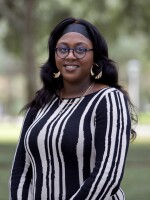The number of women in the military is rapidly growing. A 2022 Defense Department report shows that in 2021, there was an 18% increase in women in active duty and a 22% increase in women in the reserves. That’s even as the overall number of service members dropped, according to the same study.
When it comes to women veterans, Florida has the second largest population of any state.
But these days, what do women do in the military and when they leave? And what challenges do they face?
Everyone’s experience is different.
Holley Harris is the president of the Greater Tampa Bay chapter of the Women in Defense organization, a national organization that brings the Department of Defense together with all the industries that support it to create and enhance opportunities for women, and increase the diversity in the defense community. The group hosts different events throughout the year and fundraise to support STEM initiatives for K-12 girls who may not have access to STEM camps and programs.
“We’re actually comprised of more than 50% men,” Harris said. “We’re comprised of military members. Sometimes, people from base will come and join us, and reservists, spouses, and then individuals who support different industries in the area, so contracting companies.”
Harris is a U.S. Army Intelligence Officer whose been in the military for 18 years. From five years old, she was fascinated with the Army.
“I was obsessed with this show called ‘Tour of Duty’ about Vietnam. I don’t know why, it’s weird for a kid, I realize,” she said with a chuckle. “But it was always just very interesting to me. And so, I wanted to join from a very young age and never changed my mind.”
Harris had plans to enlist after high school. She did ROTC in high school and at Syracuse University before commissioning as an intelligence officer.

“I actually wanted to fly helicopters and went through a physical and my arms were too short.” Thus began her journey into intelligence, specifically in Special Operations.
Harris didn’t really face any barriers when joining the military other than having to prove herself as a woman. She had to work a little harder than the men to get recognized for the same things. However, she says things have changed now.
“I think [Special Operations] has done a great job of integrating women, in the right way, and not letting the mission get affected.”
Harris says in addition to stability, the military has provided her with skills that are easily transferable to her “day job,” something that was a little more challenging for Vanessa Thomas.
Thomas works as the women veteran’s coordinator at the Florida Department of Veteran’s Affairs. She didn’t have as much luck transferring her skills to a day job. In fact, she was specifically looked over for jobs due to her experience.
She recalled one interviewer telling her “I can’t hire you because you have more knowledge and more experience than the men that are working there now. You would intimidate them.”
Thomas worked in the Navy as a torpedomen’s mate, putting the warhead on missiles and submarines. She later switched to being a nuclear weapons technician where she would put nuclear weapons together and test their switchboards to make sure they worked.
“When I came out of the Navy in the late 80’s, I could not take my transition skills like Holley was able to,” she said. “I was in a field strictly for men. So, when I tried looking for nuclear jobs, they weren’t there.” If she did get an interview, she was often faced with the challenge of being more knowledgeable than the men at the company. Her dad encouraged her to take what she knew and apply it elsewhere.
“He said, ‘you may not go back into your world, but take some of the experiences, the leadership, the decision-making skills, and take it somewhere else.’ So that’s what I did.”
She mostly worked leadership roles in customer service-related jobs. In her current role, however, she’s able to make a great impact on the women veterans she helps.
“That’s one of the projects that we work on is identifying for when our veterans want to come into Florida, where’s the best location for them based on their jobs,” she explained. “You’re going to Orlando to work in entertainment jobs. You’re coming to Tampa because it’s technology. If they want to come to Florida, they need to know where the resources are.”
Thomas came from a military family. Her father and brother retired from the Air Force. She hadn’t considered joining until a professor “glamorized the Navy.” Needing money to finish college, and the excitement of being able to travel and be on a ship, she decided to enlist. While her family may not have agreed on her joining the Navy, they supported her decision.
“We still had that same remembrance of our grandfather saying, ‘the best thing you can do for your country is to serve in the military.’”

Thomas served in the Navy for four years active and two years reserve.
“A lot of people still think that we’re just secretaries but we’re in combat now. We are doing the same thing that men are doing,” she said. “We have the ability to fly airplanes and helicopters. We have the ability to be on the nuclear part. But we’re not recognized as that.”
She works to make sure women are seen as equals in and after the military, in addition to helping women veterans find resources to survive in the everyday civilian world.
“When I see women come out of the military, their main concern is finding the proper job and taking care of their family,” she said. “We want to make sure they understand that some of those resources that are out there and benefits that are available to them could help them either financially or educationally to get to those positions where they want to be.”
Thomas says one of the main struggles for women veterans is housing, which causes them to be homeless. Another is healthcare. A big reason for this is the lack of trust in the VA from women veterans based off past experiences and a lack of doctors available for issues specific to women. They don’t seek the VA’s help because they don’t think it will be beneficial for them.
Thomas says while the VA has come a long way, they still have a way to go. But she wants women in Florida to know that things are changing and assistance is available.
“Sometimes compensation can be over $3,500 a month. That, to me, is a financial situation that could take them out of poverty and put them into a different situation,” she said. “I’ve seen it so many times that when women veterans realize that they do have this ability to find compensation, they do.”
Listen to the full conversation using the media player above, or wherever you get your podcasts.





